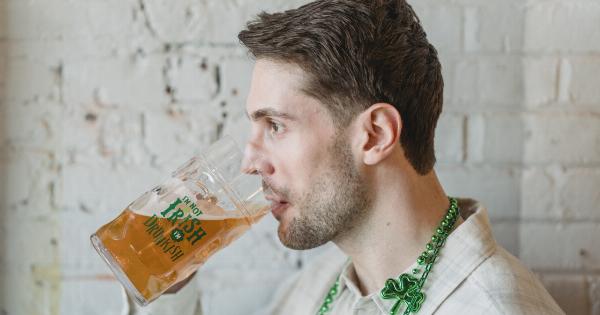Alcohol consumption is a common practice in many societies, and it can be difficult to determine when alcohol use crosses the line from social drinking to a drinking problem.
Knowing the signs of a drinking problem can help you or someone you care about seek the necessary help and support. Here are some key indicators to consider:.
1. Increased Tolerance
One sign that you may have a drinking problem is if you find that you need to consume larger amounts of alcohol to achieve the desired effect.
Developing a tolerance to alcohol is a clear indication that your body has become accustomed to the substance.
2. Difficulty Cutting Back
If you find it difficult to control or cut back on your alcohol consumption, you may have a drinking problem. Repeated attempts to quit or cut back, followed by relapses, can indicate that you have lost control over your drinking habits.
3. Neglecting Responsibilities
A significant red flag for a drinking problem is when you start neglecting your responsibilities at work, school, or home due to alcohol consumption. If alcohol becomes a priority over fulfilling your obligations, it may be time to seek help.
4. Cravings and Withdrawal Symptoms
Experiencing strong cravings for alcohol and withdrawal symptoms when you try to abstain are clear signs of a drinking problem. These symptoms can include nausea, shaking, sweating, anxiety, and even hallucinations.
Seeking medical assistance may be necessary during the withdrawal process.
5. Neglected Activities and Hobbies
If you have lost interest in activities and hobbies that you once enjoyed in favor of drinking, it may indicate a drinking problem. Alcohol can consume your time and energy, leaving little room for other meaningful pursuits.
6. Relationship Problems
Alcohol can significantly impact your relationships with family, friends, and romantic partners.
If your loved ones express concern regarding your drinking habits or distance themselves from you due to your alcohol use, it may be a sign that you have a problem.
7. Risky Behavior
Engaging in risky behavior while under the influence of alcohol, such as driving under the influence or unprotected sexual encounters, can be a clear indication of a drinking problem.
These actions can have severe consequences and should not be overlooked.
8. Legal and Financial Issues
Experiencing legal problems, such as DUI charges or public intoxication, can be a strong indication that your drinking has become problematic.
Financial struggles, such as spending a significant portion of your income on alcohol or neglecting bills to fund your drinking, should also raise concerns.
9. Social Isolation
Isolating yourself from friends and family, preferring to drink alone or avoiding social situations that don’t involve alcohol, can be a sign of a drinking problem.
Alcohol abuse often leads to a breakdown in social connections and can exacerbate feelings of loneliness and depression.
10. Physical Health Issues
Chronic alcohol abuse can lead to a range of physical health issues, including liver disease, heart problems, weakened immune system, and nutritional deficiencies.
If you are experiencing ongoing health problems related to alcohol consumption, it’s crucial to seek medical attention.
Conclusion
Recognizing a drinking problem is the first step towards recovery. If you identify with several of the signs mentioned above, it may be time to seek professional help.
Remember, you are not alone, and support is available to help you overcome your drinking problem and lead a healthier, happier life.






























